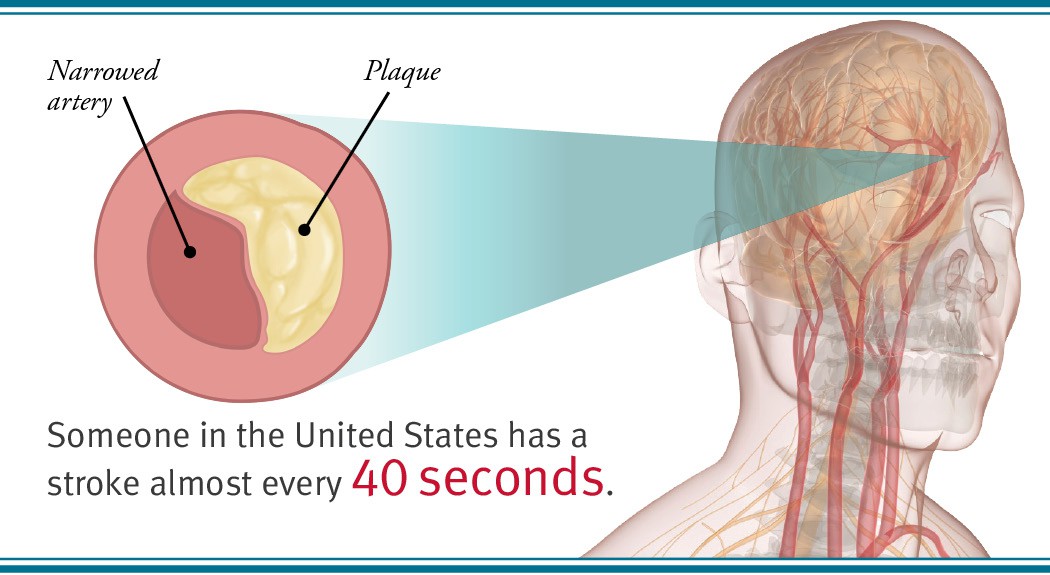Stroke is the third leading cause of death in the United States. Nearly 87 percent of all strokes are ischemic. That means a clot within a blood vessel blocks the flow of oxygen-rich blood to the brain. Most ischemic strokes are caused by atherosclerosis, or hardening of the arteries. Some chronic health conditions, if not managed well, can speed up atherosclerosis. Keeping on top of these conditions can help reduce risk for ischemic stroke and other arterial diseases, says Mark Peeler, MD, a vascular surgeon at Anne Arundel Medical Center.
Coronary heart disease, triggered by hardening of the arteries, more than doubles your risk of stroke. “When artery disease blocks blood flow to the heart muscle, there’s likely artery disease elsewhere in the body. It’s the artery disease that increases stroke risk, not the heart attack itself,” explains Dr. Peeler. “So we offer free ultrasound screenings for artery disease and then take proper steps, whether that means medical intervention or helping people start to make lifestyle changes.” The screenings are offered through a program called Dare to C.A.R.E.
 High blood pressure, or hypertension, affects nearly one in three adults in the U.S. When uncontrolled, it increases your risk for having a stroke by four to six times. But with medication and lifestyle changes, hypertension is highly controllable.
High blood pressure, or hypertension, affects nearly one in three adults in the U.S. When uncontrolled, it increases your risk for having a stroke by four to six times. But with medication and lifestyle changes, hypertension is highly controllable.
 Cholesterol is a waxy, fat-like substance produced by your liver and found in many foods. Although certain amounts of cholesterol are normal, high levels of some lipids in the blood can contribute to plaque in arteries and lead to a stroke. Depending on your levels, your primary care doctor may prescribe a medication such as a statin while guiding you toward healthy lifestyle changes. Statins are a class of drug that reduce fat levels in the blood (for example, Lipitor).
Cholesterol is a waxy, fat-like substance produced by your liver and found in many foods. Although certain amounts of cholesterol are normal, high levels of some lipids in the blood can contribute to plaque in arteries and lead to a stroke. Depending on your levels, your primary care doctor may prescribe a medication such as a statin while guiding you toward healthy lifestyle changes. Statins are a class of drug that reduce fat levels in the blood (for example, Lipitor).
 Obesity is a major health problem in America. The severity of obesity is measured by the body mass index, a calculation relating your weight to height. As your BMI increases, so does your risk for rising blood pressure, cholesterol levels, triglycerides and blood sugar. Losing 5 to 10 percent of your weight can reduce these stroke risk factors.
Obesity is a major health problem in America. The severity of obesity is measured by the body mass index, a calculation relating your weight to height. As your BMI increases, so does your risk for rising blood pressure, cholesterol levels, triglycerides and blood sugar. Losing 5 to 10 percent of your weight can reduce these stroke risk factors.
 Diabetes, when not properly managed, causes sugar to build up in the blood, which increases your risk for stroke. Many people with diabetes also have high blood pressure, high blood cholesterol and are overweight — conditions that further increase your risk for stroke.
Diabetes, when not properly managed, causes sugar to build up in the blood, which increases your risk for stroke. Many people with diabetes also have high blood pressure, high blood cholesterol and are overweight — conditions that further increase your risk for stroke.
The Best Way to Reduce Stroke Risk
Whether or not you have a chronic condition, Dr. Peeler stresses that not smoking is the single best way to reduce your risk of artery disease. “Cigarette smoking causes more deaths from cardiovascular disease and stroke than from lung cancer,” he says.





